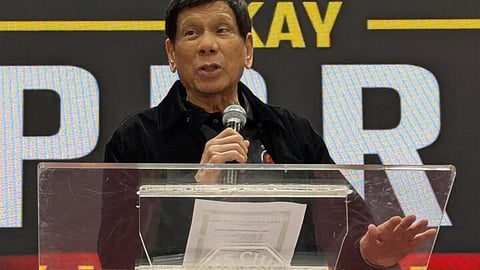
- NEWS
- the EDIT
- COMMENTARY
- BUSINESS
- LIFE
- SHOW
- ACTION
- GLOBAL GOALS
- SNAPS
- DYARYO TIRADA
- MORE

As former President Rodrigo Duterte was transported to The Hague to face charges of crimes against humanity related to his administration’s controversial war on drugs, the public is left to wonder:
What’s next?
Lawyers Howard Calleja and Edward Chico shared their insights on the matter with DAILY TRIBUNE, diving into the events of last Tuesday.
Upon Duterte’s arrival in The Hague, he will be transported to the facility where he will stay for the duration of the trial to be conducted by the International Criminal Court (ICC). Photos of the ICC’s detention center were shown on social media.
The facility has standard cells with a bed, cabinet, table and chair; there’s a library, a spiritual room, a gymnasium, an educational and occupational therapy room for use by the detainees.
According to Calleja, senior managing partner at Calleja Law, the facility is funded by the member states that are part of the ICC.
“All the member states give funds, so the food, accommodations, and whatever is needed is shouldered by the ICC,” he said in an interview on DAILY TRIBUNE’s digital show Straight Talk.
While Duterte is held at the detention center, his trial will proceed according to the procedures of the ICC. However, Duterte might need to wait for the other accused in his case to arrive.
“I expect many more accused to follow, so maybe because there are many more accused, they might wait for the others. But I think the trial will start immediately,” Calleja said.
He said Duterte can have his own lawyer from the Philippines, but he suggests the former President get a foreign counsel who is used to the ICC rules.
“I suggest that he should get one of those. That would be more prudent for him than to take someone from the Philippines. Although he’s not barred from getting anybody here,” he said.
Calleja noted that the ICC works just like any other court and may provide counsel for a defendant or a plaintiff.
Calleja said the trial will be a long process, and may take even longer should witnesses need to be transported to the Netherlands. However, as big a case as this is for Duterte, the ICC might need fewer witnesses.
For political analyst, lawyer, and DAILY TRIBUNE columnist Edward Chico, Duterte put himself in trouble with his unfiltered remarks.
“Because of the fact that he has no filters, the fact that he speaks his mind, the fact that he can lambaste anyone, anywhere, anytime he wants to basically explains why he’s in this mess now,” Chico said.
In his opinion, if the former president had restrained himself more, his fate would have been different.
“He could’ve chosen to remain quiet, but he did not do that, so definitely that would be a problem,” he said.
While Duterte is known for his off-script remarks and quips, Chico said this could be used in his defense, that he was only “joking.”
“You have to understand that it was not actually [him] who perpetrated the extrajudicial killings. It was under his instructions, so he could simply say his instructions were for the police to respect human rights and for them to defend themselves,” he said.
“‘If, for example, a person were to resist arrest violently. But I never actually said to resort to violence and blatantly disrespect human rights. That was not my instruction,’” Duterte could say, according to Chico.
Lawyers who have witnessed ICC trials or are familiar with its proceedings said cases indeed go on for a long time. However, recent trials have been speedy, resulting in a 1 to 2-year trial up to a maximum of eight years.
“It can be as quick as 1 to 2 years or as long as eight years because it depends on how serious the evidence is, the presentation. It also depends on how serious the defense is. Maybe later, the prosecution will have many witnesses, so it will take longer. Maybe later, the defense will have many witnesses, so it will take longer,” Chico explained.
He added that some trials can take up to 10 years if necessary. “Everything will now depend on the pieces of evidence and the quality of the witnesses they will import.”
